Need to know how to plan an event? If you’re planning a big event like a conference, we can help you successfully create, structure and lay out your event plan. This blog will cover everything you need to consider when planning an event, including event planning steps, tips and an easy-to-use event checklist.
What Is Event Planning?
Event planning is the process of putting on and managing a variety of events, from something as small as a meeting to as big as a convention and everything in between. When event planning you’ll be taking into account every aspect of that event, whether it’s a birthday party or a networking event.
That means you’ll be estimating budgets, creating timelines to schedule the event, reserving the site and any panels or speakers involved, getting necessary permits, food, transportation and more. If the event has a theme, you’ll develop that, too. Plus, you’ll be in charge of securing the needed resources to make the event a success.
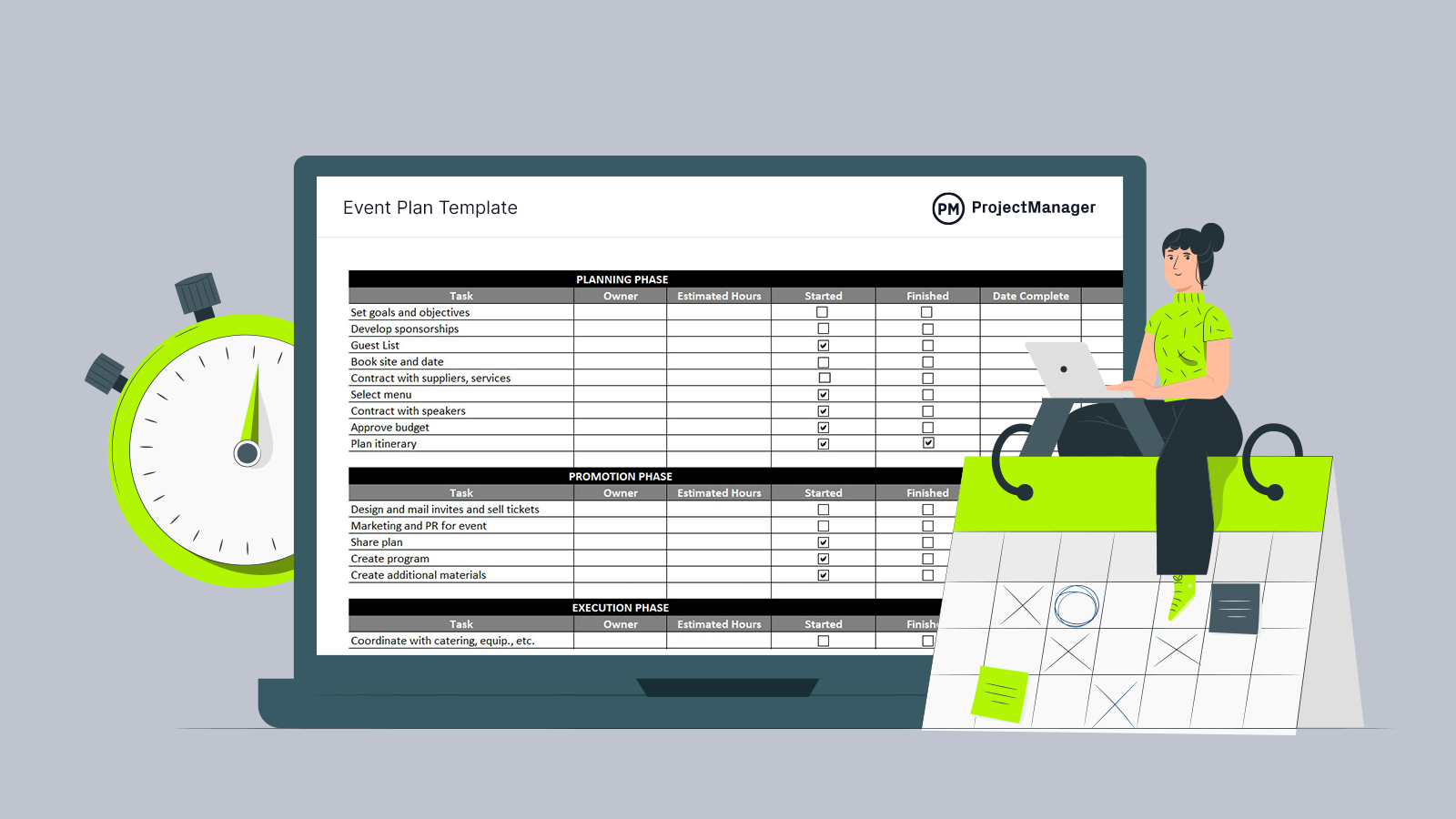
Get your free
Event Plan Template
Use this free Event Plan Template to manage your projects better.
Get the template
What Is an Event Plan?
An event plan defines how an event will be executed. It addresses all the components of an event such as the start and end dates, budget, venue, marketing, attendees and more. The scope and complexity of the event plan vary depending on the size of the event, but the fundamental challenges remain the same.
Organizing all those disparate parts, especially for larger events, requires powerful project management software. ProjectManager is award-winning project management software that lets you plan, manage and track your event to ensure it’s a success.
Our powerful Gantt charts help you list all your tasks and the associated resources and costs, assign them to your team and set milestones to track your progress. The whole plan is visible on a project timeline and can be saved by setting a baseline. Now you can track the planned progress against your actual progress to make sure you’re on schedule. Get started with ProjectManager today for free.
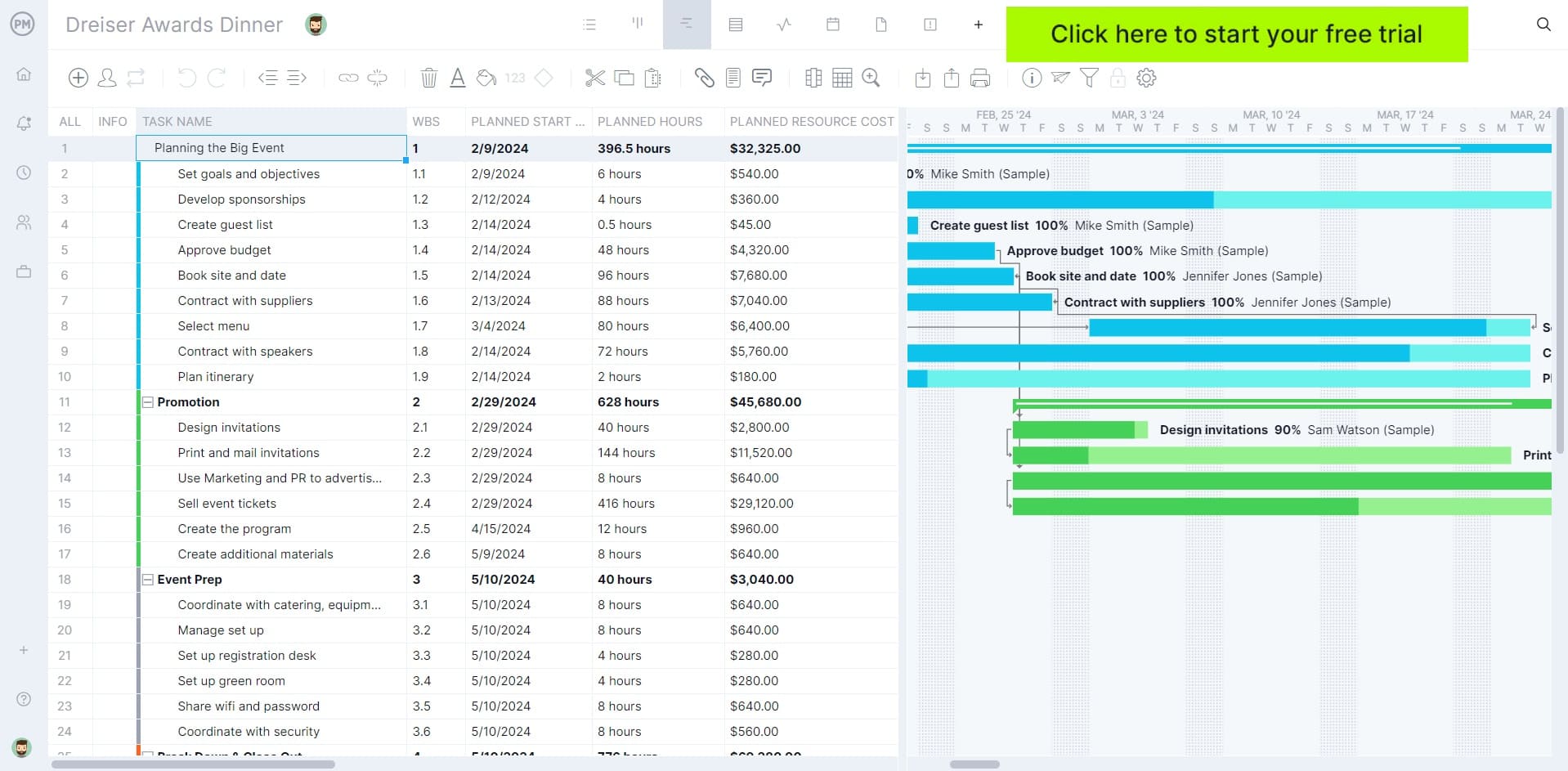
Who Makes and Manages an Event Plan?
Various event professionals are typically responsible for creating and managing an event. The event planner or coordinator will create the event plan, working with the client or organizing body to understand the event’s goals, target audience, budget and desired outcome. From there, the event manager will take over and help execute the event plan. They oversee the on-the-ground logistics of the event and ensure it goes according to plan.
Depending on the event’s size and complexity, there may be a dedicated event team to create and manage the plan. They can help with logistics, sponsorship, fundraising, marketing, registration, etc. Some key stakeholders may be involved in the event plan, such as community leaders, sponsors or speakers. They can provide input during the planning process and must be kept informed about the plan.
Event Plan Example
Most of us have some experience planning an event, be it at home, work or in our community. For this article, let’s focus on large events.
A conference is a common type of large event, so for our event management purposes, let’s talk about a TEDx conference that we were involved in to illustrate how to plan an event. This example is a good scenario to explain the structure and challenges of planning a big event, along with the benefits of planning an event with project management software.
Let’s break down the other components of setting up an event. They’re summarized below:
- Event timeline: First, establish a timeline for your event. This timeline should include pre-event planning, event execution and post-event activities.
- Budget: Estimate your event costs and create a budget. Your available budget will influence many event management decisions such as your venue, the marketing and advertising methods, etc.
- Venue: The event has to take place somewhere, and that involves logistics management, food and beverages as well as the décor.
- Marketing: Once you’ve selected a venue, you need to start drawing people to it through a marketing program that can include a website, social campaign, email and print work.
- Advertising: Hand in glove with marketing is advertising. That can include radio, TV, newspaper and magazine advertisements.
- Volunteers: A big event needs a big crew of people to get it off the ground and run smoothly. That means volunteers, which means writing contracts, defining their roles, setting up meetings and determining schedules.
- Speakers: You must have a keynote speaker or a group of speakers to attract an audience. This involves contracts, curators to select the talent, a program, bios and rehearsals.
- Sponsors: All of this costs money, and a big event’s budget is supplied by its sponsors. This again involves contracts, marketing and logistics.
- Production: The production involves creating contracts as you work on creating an audio-visual recording of the proceedings, as well as a sound and video broadcast during the event.
- Stage: The event takes place at a specific venue and on that venue is a stage on which the event proper will be presented. That usually incorporates a projector, screen, microphones, internet connection, batteries, cables and more.
- Attendees: Don’t forget about the people attending the event! You’ll need communications to inform them of event information, payment processes to collect fees, emails to stay in touch, directions, badges and access points.
The Event Planning Process: Event Planning Steps
We covered a lot on event planning, so let’s break down those tips into concrete steps. These event planning steps will guide you toward success. Let’s continue with our conference example.
1. Determine Event Goals and Objectives
For the TEDx conference, what do you want the goals and objectives to be? This will help define how to measure the event’s success. Why is the event happening? What problem are you trying to solve? What message do you want to convey? Consider the overarching organizational goals and how the event aligns with the broader mission, values and strategic objectives.
When possible, make these goals under the SMART criteria (specific, measurable, achievable, relevant and time-bound). For this particular event, the goals may be to spread brand awareness, raise a target number of funds or generate a certain number of qualified leads.
2. Assemble the Team
Now that the goals and objectives are clear, next comes assembling the team. What core roles are needed to run the TEDx conference? Common roles include the event manager, planner, logistics coordinator, communications manager, finance manager or creative lead. If needed, hire external professionals outside of the organization to ensure the event runs smoothly or tap into the skills of internal team members based on their strengths and expertise.
3. Establish an Event Budget
Next, determine what the conference’s budget will be. This will be based on the goals and objectives of the event. Consider expense categories such as the venue, catering, beverage, marketing, promotions, speaker fees, staffing, labor, technology and transportation. In the case of this event, a large portion of the budget may be going to the speaker, as they are the main attraction of the event.
4. Choose a Date & Venue
Find a date that works for not only your company but also for the main parties involved. Ideally, you’ll provide more than one option for them in case a backup plan is needed. Before selecting a venue, do research and get various quotes that fit your event size and style. These may include event spaces, hotels, cultural institutions or even outdoor venues, weather permitting.
5. Select the Speakers
By this point, you likely have an idea of who you want the speaker or speakers to be at the event. Reach out to them and get a quote on how much it will cost to hire them. If needed, make adjustments to the budget or have a backup in mind in case it doesn’t work well with your budget.
6. Event Marketing & Advertising
Now that the details of the event are in place, it’s time to promote it. Ideally, there should be a dedicated event website or landing page that includes all event details. Outline the agenda, speakers, location, etc. Social media is also a great way to promote the conference, such as teasers, speaker spotlights or behind-the-scenes footage. Email marketing, video marketing, and search engine optimization (SEO) marketing are beneficial to utilize as well. Using a reliable event ticketing system can also streamline the registration process and enhance the attendee experience.
7. Execute the Event
In this last step of the event planning process, it’s time to enjoy your hard work and see the event come to life. As the event is taking place, take notes on what is going well and what isn’t going to plan. These details can help avoid similar mistakes in the future or act as a guideline for success.
When you break down the scope of your event plan into manageable steps, the process seems a lot less daunting.
Free Event Plan Template
This free event plan template for Excel is a great tool to start assembling the information you need to create an event plan. It can be customized to add your event details.
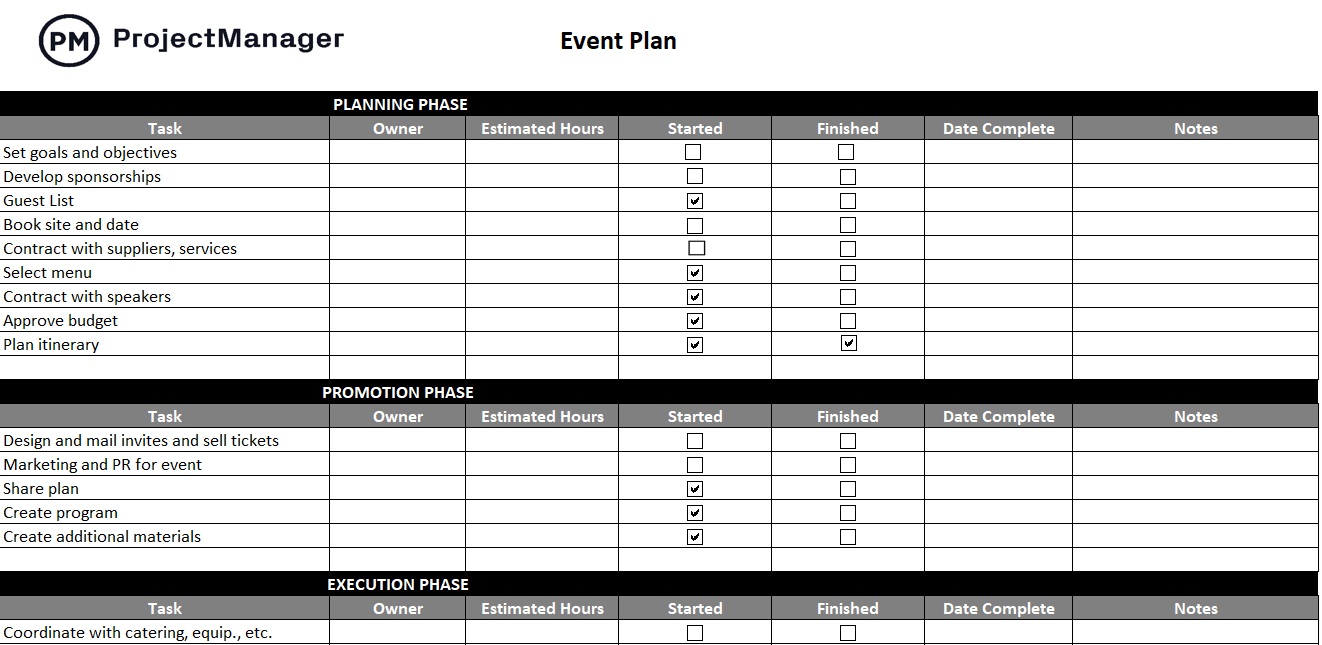
Related: 12 Free Event Planning Templates for Excel & Word
Event Planning Roles
As you might expect, there are many different roles that work together to bring an event to life. It’s easy to get confused. Are you an event manager or an event planner? Is there any difference between the two? Let’s take a look at some of the more common event-planning roles and define them.
Event Manager
The event manager is often mistaken for the event planner, but they are two distinct roles. Most simply, the event manager is responsible for event management activities, which involve coordinating and implementing the event. They take care of setting up the event, including its design, and make sure the vision of the event planner is realized.
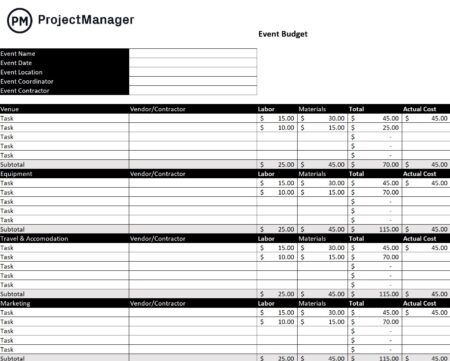
Event Planner
An event planner organizes, coordinates and executes the event. They’re in charge of coming up with the idea, overseeing the setup and breakdown of the event. They’ll select the venue, create the budget and ensure everything is taken care of. What sets them apart is they design the strategy for the event to the smallest detail.
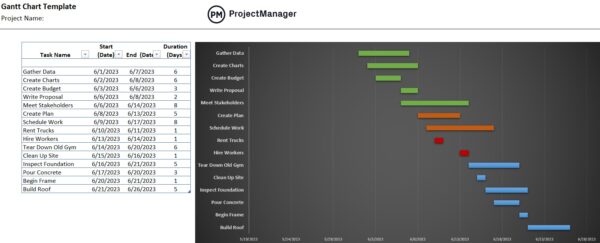
Event Producer
The event producer fleshes out the strategic plan of the event planner. They are the one who takes the idea and turns it into a living event. They will take charge of the technical aspects of the event, such as audio/visual, stage design, etc. They work with the event planner to schedule the event, but the event producer uses their skills and expertise in producing events to deliver the event that’ll impress both attendees and the client.

Event Planning Tips
Unfortunately, there are always going to be variables out of your control that’ll affect the event planning process, such as the weather, delivery delays, technical difficulties and other potential mix-ups. As stated earlier, you can’t change the date of your event, so you’ll want to be as prepared as possible for any risks or issues that may pop up on the day of your event.
Do a Post-Event Review
A post-event review or a post-mortem as they’re often called, is very valuable. By looking back at the past event and seeing what worked and what didn’t work, you can better plan your next event. There are always lessons to be learned and applying them to the next project will avoid previous mistakes and increase your chances of a better outcome.
Use Event Planning Templates
Having an event planning template is a great way to make sure you’re not missing any important pieces of the larger event. It’ll help you organize your tasks and resources, costs and more. Use our free event plan template to get started on the right foot.
Use Event Planning Tools
A template is fine, but limited. You have to manually update everything and it’s not very collaborative. Event planning tools, such as Gantt charts, kanban boards, task lists and calendars, help you plan and implement the event plan. They also allow you to track the work to make sure it’s following the plan, which leads to a more successful event.
Prepare a Plan B
As important as your plan is, there can be issues with it. There might be acts of god, such as weather, which negatively impact the event. Whatever the cause, you’ll need a backup. That’s why developing a plan B is so critical to the success of the event. You might never have to use it, but in case you do, you’re prepared.
Use an Event Planning Checklist
Another tip is to have a checklist made up. That way you can collect all the things you have to do and why you’re doing it in one place. Using a checklist for event planning can be done in conjunction with project planning tools. The more safeguards, the better. Also, there are few things more satisfying than crossing something off your list.
Event Planning Checklist
There’s a lot to manage when planning an event, so it’s important to have a list of everything you need to include in your event management plan. The following is a general event planning checklist to help you get started. The more questions you ask, the better your event checklist. Feel free to add your own unique responsibilities and tasks.
Goals and Objectives
- What’s your event’s reason for existing?
- What are the goals this event is expected to achieve?
- What are the revenue objectives?
- What is your target audience?
- How many people will attend?
- Is there a cost associated with ticketing and what is it?
- Where is the event being held?
- Create an event schedule.
Event Budget
- Figure out what the costs will be
- If you held similar events, use and adjust an old budget for a baseline
- What ticketing and registration software will be used?
- Finalize sponsor contributions
- Set ticket price
Date & Venue
- When will the event take place?
- Have a backup date in case issues arise
- Is there the best location for the event?
- Is the venue appropriate for your expected number of attendees?
- Decide on needed infrastructure: wifi, capacity, bathrooms, near shopping & restaurants, etc.
- Hire a caterer
- Secure what equipment you’ll need
- What are your security needs?
- Do you need permits, licenses or insurance?
- Create event signage and communication plans for attendees
Speakers
- Research potential speakers
- Create a list of relevant speakers
- Create a pitch for speakers
- Pitch speakers
- Finalize speaker selection, get bios and headshots and arrange travel and accommodations
Sponsors
- Develop a list of sponsors and what you can offer them.
- See if there are sponsors who have partnered with similar events.
- Reach out to potential sponsors.
Website
- Design signoff.
- Update the site or build a unique one.
- Make sure the site can handle expected traffic.
- Have a mobile-friendly site.
Event Marketing & Advertising
- What’s your messaging?
- Coordinate with digital tools and social platforms
- Add the event to online calendars
- Market the event with blog posts and other promotions like videos and online ads
- Send reminders to all parties a month or two before the event date
Finalizing the Last Steps
- Schedule
- Caterer
- Speakers and scripts
- Venue
- Equipment
- Decorations
- Contracts
Pro tip: That’s a lot to coordinate and plan, which is why there’s a need for project management software that has the right features for event management. It provides a common portal, where you can track costs and tasks with automated alerts. It also offers both a communication and a collaborative platform that reduces the need for unnecessary emails. Software collects all your files in one place and makes team reporting simpler by adding efficiencies and reducing stress.
ProjectManager Offers Robust Event Planning Tools
ProjectManager is online software that’s suited for event planning. We have event project management tools to keep all the parts of your events, from managing vendors to promotions, organized. Our planning software helps you keep track of all the elements that make up your event plan.
Keep Stakeholders Updated With Event Calendars
Our multiple project views mean that event planners and managers can use project calendars, Gantt charts and there are task lists and kanban boards for teams. While reports can keep stakeholders informed, they might want to have access to the project. Share the calendar view with your stakeholders, which allows them to see start and end dates for all the tasks as well as milestones. This manages their expectations.
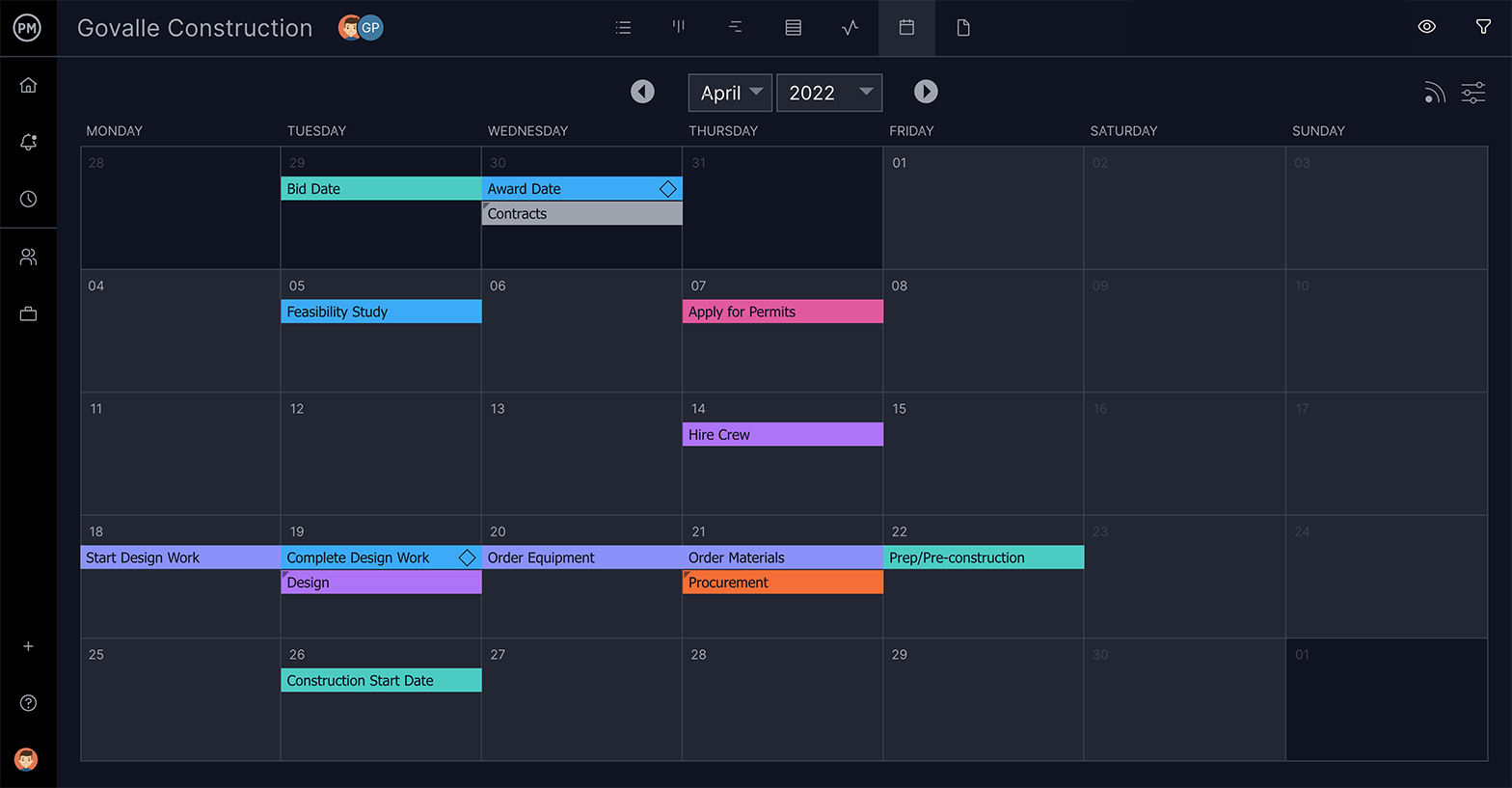
Zoom Into Event Activities With Kanban Boards
Use ProjectManager’s kanban board to manage the daily activities that need to be executed to plan, schedule and track your event plan. Move tasks from column to column as you collaborate on work with your team, and it’s easy to spot bottlenecks and get everything over the line in time for the event.
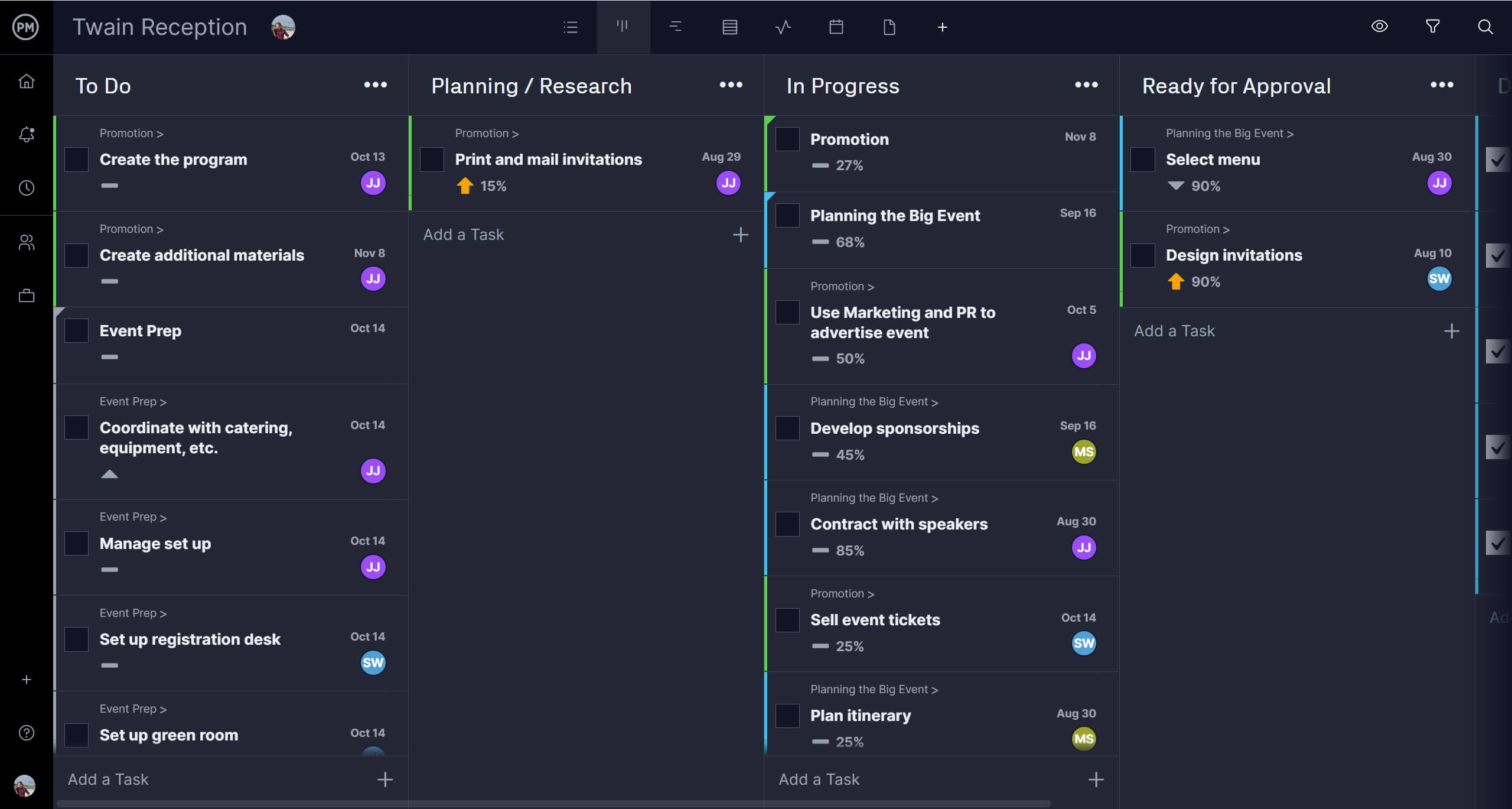
Track Event Labor Costs With Timesheets & Real-Time Dashboards
Plus, timesheets make invoicing easy for all your events. They can be submitted and approved with a keystroke. Our software also offers a variety of views, from a list to a calendar and even a kanban board that helps you visualize the workflow to keep on task.
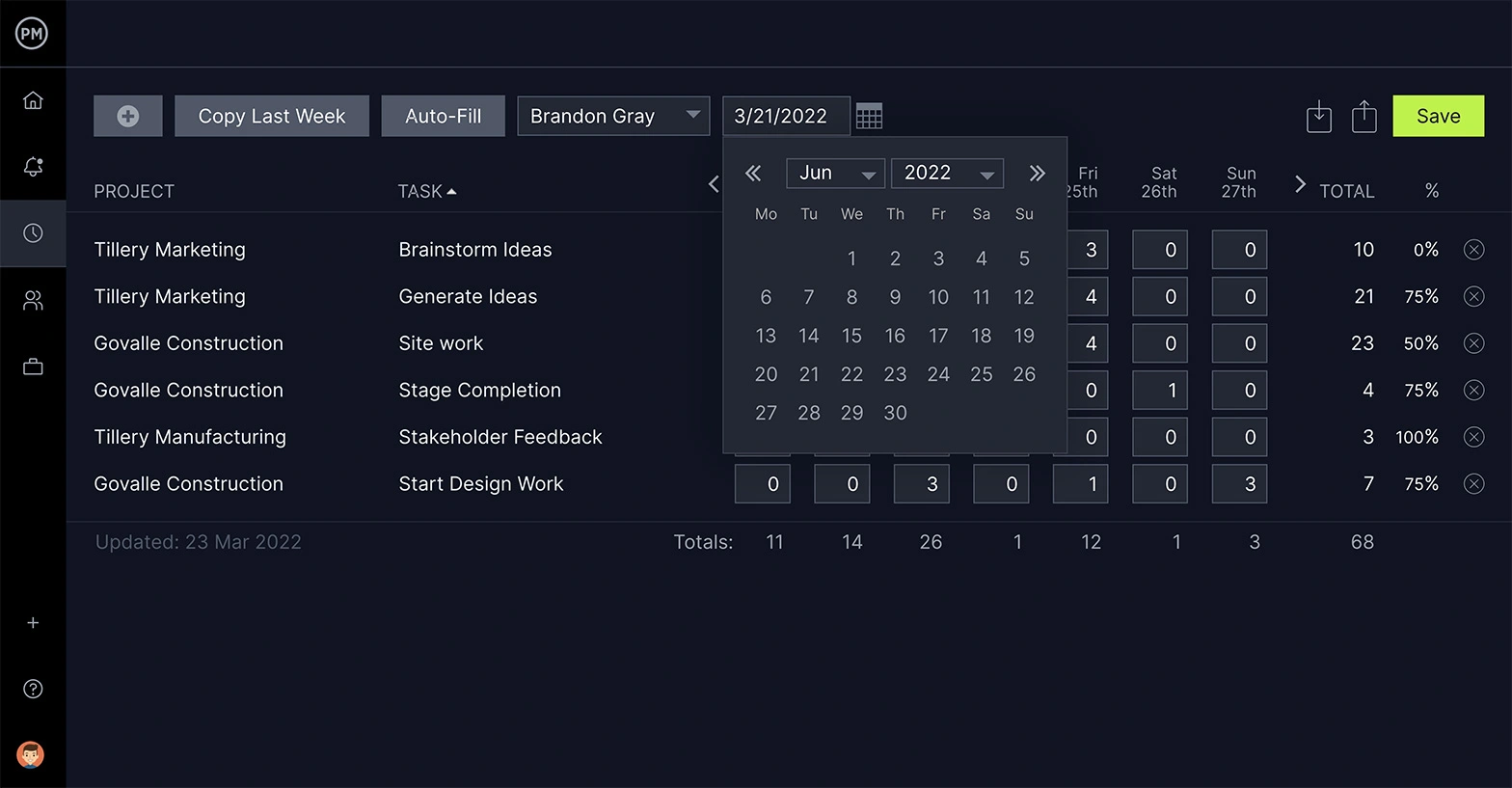
More About Planning an Event
Event planning can be complex. There’s a lot of balls to keep in the air. If the above is too much to digest immediately, you could start with our event plan template and watch one of our planning experts. Jennifer Bridges, PMP, has years of experience and uses it to teach you the fundamentals of event planning in this short video.
Related Event Planning Content
- Gantt Chart Template for Event Planning
- Free Event Proposal Template
- Event Management: A Quick Guide
- How to Plan a Virtual Event: Virtual Event Planning Checklist
- How to Plan a Webinar: Webinar Planning Steps
- Event Project Management Software
- Planificación de eventos: ¿cómo hacer un plan de evento?
ProjectManager is award-winning project management software that helps you plan and monitor your event details. From powerful planning tools to real-time reports and dashboards that capture all of your event details, you can use our software to stay on schedule and stick to your planned budget. Try our software today with a free 30-day trial.

